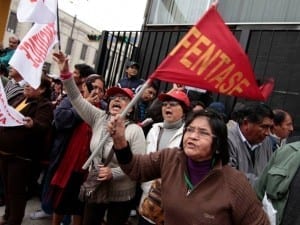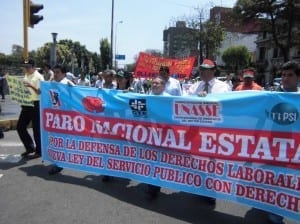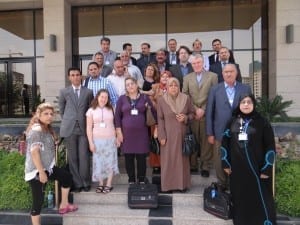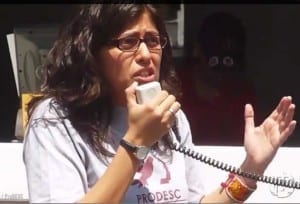Feb 1, 2014

Public employees in Peru rally against a civil service law that takes away collective bargaining rights (above and below). Photos: Marcela Arellano Villa
Seeking to reach a collective bargaining agreement with the Peruvian government, three public-sector union confederations presented a joint petition to government officials in recent days. The bargaining proposal includes the freedom for workers to form unions, and stresses that worker rights should not be negated even though civil service is a “vocation and calling.”
Peruvian unions took inspiration from their brothers and sisters in Colombia, Argentina and Uruguay, who have negotiated similar industry-wide collective bargaining agreements.
The industry-wide bargaining proposal “is an opportunity to advance respect for freedom of association and collective bargaining in the public sector, which are currently under threat,” said Jorge Villa Garcia, deputy secretary general of the National Federation of Administrative Workers in the Education Sector (FENTASE). “It’s a chance for us to negotiate fair wages and establish agreements that will prevent conflict and help us build a better Peruvian civil service.” Villa Garcia is also Public Services International (PSI) coordinator for Peru
 Last July, the government passed a new civil service law that eliminated the right of more than 500,000 public administration workers to collectively negotiate salaries, narrowed the definition of the type of unions they may establish and prevents “essential service” unions from striking (without defining essential services).
Last July, the government passed a new civil service law that eliminated the right of more than 500,000 public administration workers to collectively negotiate salaries, narrowed the definition of the type of unions they may establish and prevents “essential service” unions from striking (without defining essential services).
The International Labor Organization (ILO) has criticized the new law for its unfair restrictions on collective bargaining and the right to strike. Some members of the Peruvian Congress and human rights organizations have noted that portions of the law are contrary to international labor legislation and say it provides no mechanisms to promote the provision of quality public services. Three separate lawsuits charge the civil service law violates the constitution, and members of the Peruvian Congress have sponsored five bills to modify it.
Peru’s new civil service law is part of a “second generation” of neoliberal state reform that includes the country’s privatization of its health, education and other public services, actions that entail the elimination of many public-sector jobs, according to PSI. Public-sector worker rights are under attack in Latin America and elsewhere around the world, even as rising inequality and lack of jobs, especially for young workers, further limit the ability of working people to support themselves and their families.
The Solidarity Center actively assists public-sector workers in defending their rights across the Andean region, including in Peru, Ecuador and Colombia, and in coordination with PSI, the global union federation that represents public-sector workers worldwide.
Jan 22, 2014

Iraqi union leaders and Solidarity Center staff last May. Credit: Solidarity Center
Update: The draft version of Iraq’s new labor law emerged from Parliament in recent days but falls far short of protecting workers freedom to collectively bargain, according to Iraqi union leaders.
On Friday, Iraqi union leaders expressed their concerns to members of Parliament at a Solidarity Center-sponsored conference, and union leaders have written a letter to the Speaker of Parliament in which they detail the proposed law’s shortcomings. Read the letter in English and Arabic. The AFL-CIO also has written to the Speaker of Parliament expressing “deep disappointment” that the proposed legislation “contains several provisions that violate international standards.” Read the AFL-CIO letter.
January 10, 2014—The Iraqi Parliament is currently debating legislation that for the first time could contain worker rights protections in line with core labor standards, including freedom of association. The law would replace the 1987 labor law passed by Saddam Hussein’s regime.
The vote comes nearly a decade after the Inetrnational Labor Organization (ILO) first worked with the government of Iraq to draft new legislation. The ILO commented on drafts in 2007 and 2012, finding them severely inadequate in regards to protecting the rights of workers, in particular freedom of association.
Six major Iraqi labor unions, together with the Solidarity Center, have worked since June 2012 to bring proposed changes to the nation’s draft labor law in line with International Labor Organization (ILO) conventions. In addition, the Solidarity Center facilitated meetings among the unions and the labor committee in parliament, the Iraqi Ministry of Labor and Social Affairs, and the International Trade Union Confederation (ITUC) and the ILO, which provided recommendations based on ILO conventions. The labor federations launched a public advocacy campaign for passage of the labor law, and have received strong support from the global labor movement, including global union federations, the AFL-CIO and the British Trade Union Congress (TUC).
On a parallel front, a new union law that would replace the 1987 Trade Union Law had its first reading in Parliament this week. The 1987 Trade Union Law bans public-sector unions, which include the majority of Iraqi workers, restricts union pluralism and allows government interference in internal union affairs.
The Solidarity Center has worked closely with the Iraqi labor movement to secure passage of the new trade union law that protects freedom of association for all workers. Parliament plans to hold its second reading before the end of January, after which Iraqi unions will advocate for Parliament to vote on it before the current session ends in April.
Jan 17, 2014

A Guatemalan banana worker.
Earlier this month, on January 5, Guatemala’s first homicide of the new year took the life of 19-year-old Marlon Dagoberto Vásquez López, an active youth leader and member of the construction workers’ union, Sindicato Nacional de Trabajadores de la Construcción y Servicios de Guatemala (SINCS-G). His murder brought to 65 the toll of trade unionists assassinated in the country since 2007. Most of their murders have gone unsolved, making Guatemala the most deadly place to be a union member, after Colombia.
The Solidarity Center works with SINCS-G and other Central American unions.
Last Friday, 11 members of the banana worker union, Sindicato de Trabajadores de la Empresa Agropecuaria Omagua, S.A. Campo Verde I y II, held a meeting at their headquarters in Izabal, Guatemala. As they held their meeting, an unknown vehicle approached from the highway fronting the Honduran border and unleashed gunfire upon the plantation workers, shooting Juan DeDios Sagastume Rodas, secretary general for the union. Despite being immediately informed of the attack, the National Police never appeared at the crime scene and waited until the following day to interview the victim at the hospital.
Over the past three years, seven banana union leaders have been murdered in Guatemala. The country has recently committed to a Labor Enforcement Plan as it attempts to avoid arbitration for violating the labor chapter of the CAFTA-DR free-trade agreement. The U.S. government filed the labor complaint in April 2008 based on evidence provided by six Guatemalan unions and the AFL-CIO. The Guatemalan government also committed to the Workers’ Group of the International Labor Organization “to ensure the safety of workers, with effective measures to protect union members and leaders, and their property, from violence and threats.”
The astounding violence of the first weeks of 2014 against trade unionists in Guatemala must end. The American labor movement joins Guatemalan union federation UNISTRAGUA and the Trade Union Confederation of the Americas (TUCA-CSA) to demand President Otto Pérez Molina ensure prompt investigations of these attacks against union members, find the perpetrators and define a policy and actions to guarantee the life and physical integrity of union members and freedom of association
Jan 7, 2014

Credit: Congress of Haitain Workers
Four years ago this weekend, a massive earthquake brought catastrophe to the lives and livelihoods of tens of thousands of Haitians. Despite an outpouring of promises and millions of dollars in investment designated to help workers get back on their feet, the majority of Haitians still live in poverty. Instead of supporting recovery, their meager incomes fund little more than continued privation.
Formal jobs, particularly those in the export sector, were presented as the panacea to Haiti’s economic woes and key to helping Haitian men and women move forward. Yet four years after the January 12 quake, the country has five minimum wages, divided by sector—none of them enough to cover basic expenses, said Molly McCoy, Americas regional program director for the Solidarity Center. “These should be good jobs, but workers are telling us that no one is getting by.”
The Collective of Textile Factory Unions Organization (KOSIT), an alliance of four Solidarity Center partner unions in the garment sector, is calling for a minimum wage that will enable workers to meet their basic needs.
Workers with export-related jobs such as garment assembly, a sector that largely employs women, say they often take home lower than the minimum wage because it is tied to complicated and unreachable quotas. And recent studies point to factories cheating workers out of earned wages, exacerbating the struggle to earn a decent living. Meanwhile, prices in the island nation, a net importer of food and fuel, continue to rise.
As the Solidarity Center reported in 2011 and continues to hear from workers in the capital, Port-au-Prince, workers cannot earn enough to feed and shelter their family, cover transportation to work and send their children to school.
“Haiti needs a single minimum wage that all workers are able to earn—one that people can actually live on,” said McCoy. “Exploitive jobs that mire working people in subsistence lives is the wrong combination for recovery, much less for building Haiti back better.”
Jan 3, 2014

Alejandra Ancheita, a Mexican human rights lawyer, is featured on Moral Courage TV.
Alejandra Ancheita, a Mexican human rights lawyer, bravely fights for social justice and human rights in her country–following in the footsteps of her activist father, who died under questionable circumstances on her eighth birthday.
She founded ProDESC, an organization that fights for economic, social and cultural rights and which is a Solidarity Center partner.
Ancheita regularly receives death and other threats for her support for vulnerable people in her country including as a direct result of her work to support workers and community members trying to win justice from a Canadian mine company in the state of Durango.
Her story is featured on Moral Courage TV.
Story in Spanish here.

 Last July, the government passed a new civil service law that eliminated the right of more than 500,000 public administration workers to collectively negotiate salaries, narrowed the definition of the type of unions they may establish and prevents “essential service” unions from striking (without defining essential services).
Last July, the government passed a new civil service law that eliminated the right of more than 500,000 public administration workers to collectively negotiate salaries, narrowed the definition of the type of unions they may establish and prevents “essential service” unions from striking (without defining essential services).



